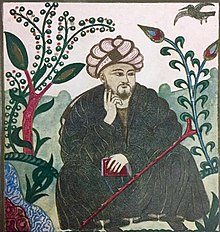Alfarabi
| Abū Naṣr Muḥammad ibn Muḥammad Fārābī | |
|---|---|
 |
|
| Title | The Second Teacher |
| Born | c. 872 Fārāb on the Jaxartes (Syr Darya) in modern Kazakhstan or Faryāb in Khorāsān (modern day Afghanistan). |
| Died | c. 950 Damascus |
| Ethnicity | Persian or Turkic |
| Era | Islamic Golden Age |
| Religion | Islam |
| Main interest(s) | Metaphysics, Political philosophy, law, Logic, Music, Science, Ethics, Mysticism,Epistemology |
| Notable work(s) | kitāb al-mūsīqī al-kabīr ("The Great Book Of Music"), ārā ahl al-madīna al-fāḍila ("The Virtuous City"), kitāb iḥṣāʾ al-ʿulūm ("On The Introduction Of Knowledge"), kitāb iḥṣāʾ al-īqā'āt ("Classification Of Rhythms") |
Al-Farabi (/ˌælfəˈrɑːbi/; Arabic: ابو نصر محمد بن محمد الفارابي Abū Naṣr Muḥammad ibn Muḥammad Al Fārābī;, known in the West as Alpharabius (c. 872 in Fārāb – between 14 December, 950 and 12 January, 951 in Damascus), was a renowned philosopher and jurist who wrote in the fields of political philosophy, metaphysics, ethics and logic. He was also a scientist, cosmologist, mathematician and music scholar.
In Arabic philosophical tradition, he is known with the honorific "the Second Master", after Aristotle. He is credited with preserving the original Greek texts during the Middle Ages because of his commentaries and treatises, and influencing many prominent philosophers, like Avicenna and Maimonides. Through his works, he became well-known in the East as well as the West.
The existing variations in the basic accounts of al-Farabi's origins and pedigree indicate that they were not recorded during his lifetime or soon thereafter by anyone with concrete information, but were based on hearsay or guesses (as is the case with other contemporaries of al-Farabi). Little is known about his life.Early sources include an autobiographical passage where al-Farabi traces the history of logic and philosophy up to his time, and brief mentions by Al-Masudi, Ibn al-Nadim and Ibn Hawqal. Said Al-Andalusi wrote a biography of al-Farabi. Arabic biographers of the 12th-13th centuries thus had few facts to hand, and used invented stories about his life.
...
Wikipedia
